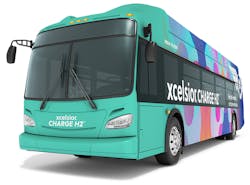New Flyer unveils Xcelsior CHARGE H2 bus becoming the first to offer two fuel cell-electric models eligible for federal funding
New Flyer of America Inc. and New Flyer Industries Canada ULC unveiled the Xcelsior CHARGE H2 – its fuel cell-electric heavy-duty transit bus – and announced that both the forty-foot and sixty-foot model have successfully completed the Federal Transit Administration Model Bus Testing Program at Altoona, Pennsylvania (“Altoona Testing”).
This makes the Xcelsior CHARGE H2 the first sixty-foot fuel cell-electric bus to complete Altoona, and establishes New Flyer as the only manufacturer to offer both a forty-foot and sixty-foot fuel cell-electric model that qualifies for federal funding.
The Xcelsior CHARGE H2 are vehicles that use environmentally-friendly hydrogen and fuel-cell technology to create electricity and charge batteries for extended-range zero-emission transit operations, saving 85-175 tons of greenhouse gas per year from tailpipe emissions compared to a traditional diesel bus. With a range of up to 300 miles, the bus can be refueled in 6-20 minutes depending on the model and operating conditions, and requires no overnight plug-in electrical re-charging. The Xcelsior CHARGE H2 also features regenerative braking while decelerating, which recharges the batteries and reduces energy consumption for extending range. The only tailpipe output is clean water vapor.
New Flyer has over 50 years of experience manufacturing zero-emission buses (“ZEBs”). It introduced its next-generation battery-electric bus, the Xcelsior CHARGE in 2017. With the addition of the Xcelsior CHARGE H2, New Flyer offers the most diverse lineup of commercially available zero-emission transit buses in North America, and remains the only North American manufacturer to provide all three types of ZEB propulsion systems: trolley-electric, all battery-electric, and fuel cell electric.
New Flyer is currently delivering twenty-five (25) Xcelsior CHARGE H2 fuel cell-electric buses to three transit agencies as part of California Climate Investments (CCI). CCI is a statewide initiative that puts billions of Cap-and-Trade dollars to work reducing greenhouse gas emissions, strengthening the economy, and improving public health and the environment, particularly in disadvantaged communities, low-income communities, and low-income households. New Flyer also continues to partner with the Center for Transportation and the Environment (CTE) and CALSTART on programs to advance electric bus commercialization.
“With the addition of the Xcelsior CHARGE H2, New Flyer proudly offers a robust line-up of zero-emission transit buses to assist in the transition to clean transit, to serve the evolving needs of communities, and to meet increasingly stringent greenhouse gas emissions regulation such as California’s Innovative Clean Transit Rule,” said Chris Stoddart, president, New Flyer. “We anticipate fuel cells for extended range will complement all battery-electric technology, not only in transit, but other industries such as commercial trucks.”
According to the California Air Resources Board (“CARB”), adopting zero-emission public transit can reduce greenhouse gas emissions by 19 million metric tons from 2020 to 2050 – the equivalent of taking 4 million cars off the road – and will reduce emissions by approximately 7,000 tons. Programs like CARB’s Innovative Clean Transit (ICT) regulation challenges transit agencies to look for cleaner energy sources by mandating that California public transit agencies operate 100 percent ZEBs by 2040.
New Flyer currently has significant ZEB orders from major cities including Toronto, Boston, Minneapolis, New York, Portland, and Vancouver. In California alone, New Flyer has sold nearly 80 battery-electric buses, with active programs in Coachella Valley, Los Angeles, Oakland, Orange County, and San Diego. Since 1972, New Flyer has delivered over 10,000 buses to the state of California, beginning with zero-emission trolley-electric buses.
In January 2019, New Flyer expanded its product offering by introducing New Flyer Infrastructure Solutions™, a service dedicated to providing safe, reliable, smart, and sustainable charging and mobility solutions as transit agencies look to transition their traditional fleets to zero-emission.
In 2018, New Flyer became the first bus manufacturer in the world to sign on to the Shared Mobility Principles for Livable Cities, joined CharIN to support industry charging standards for all electric vehicles, became the first licensee outside the Volvo Group to join OppCharge in North America, signed CALSTART’s Global Commercial Drive to Zero to support fast-tracking adoption of clean trucks and buses, and also signed the Transportation Electrification Accord focused on driving an equitable and prosperous future for electrified transportation.



